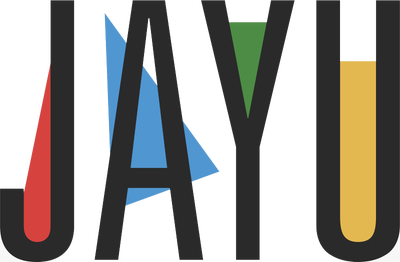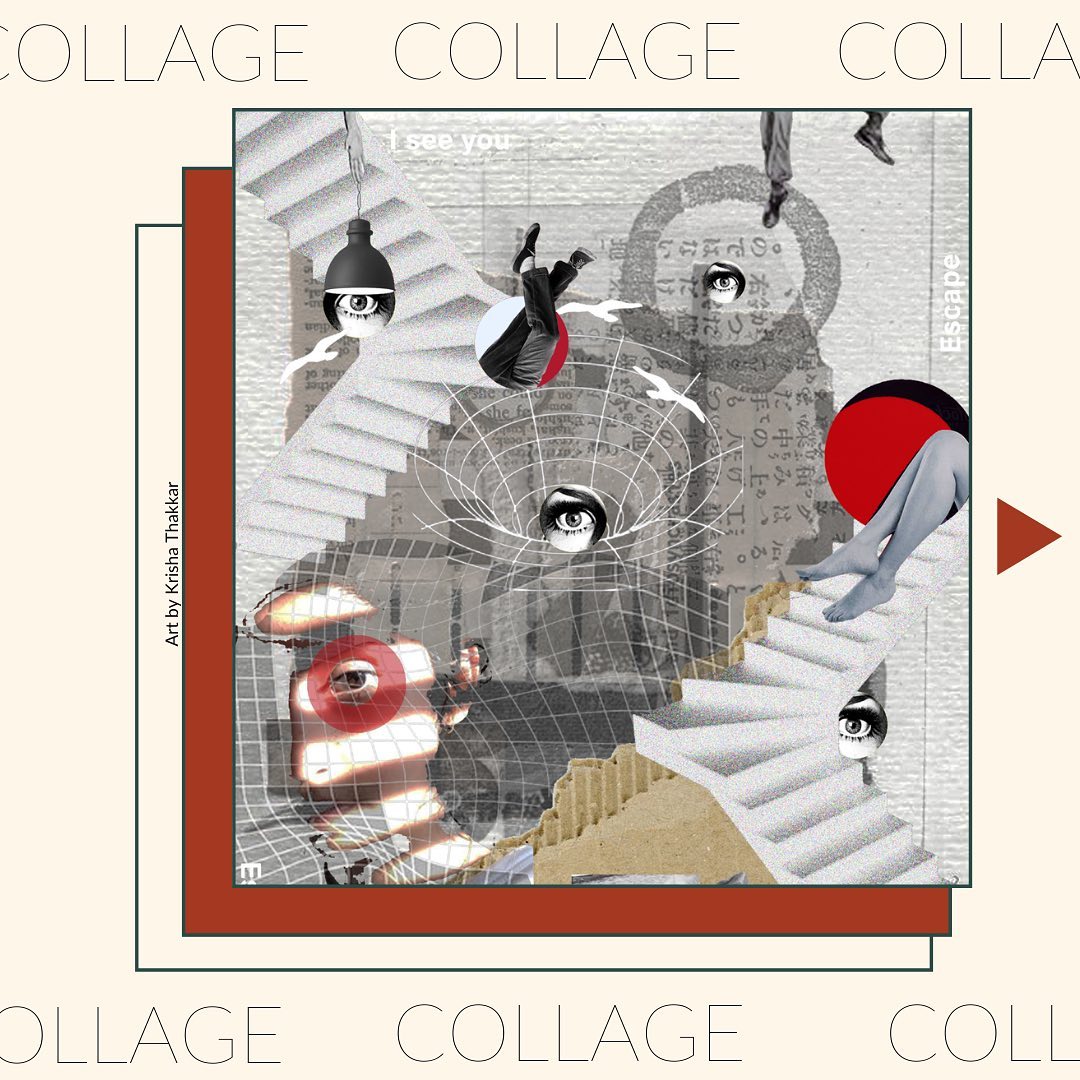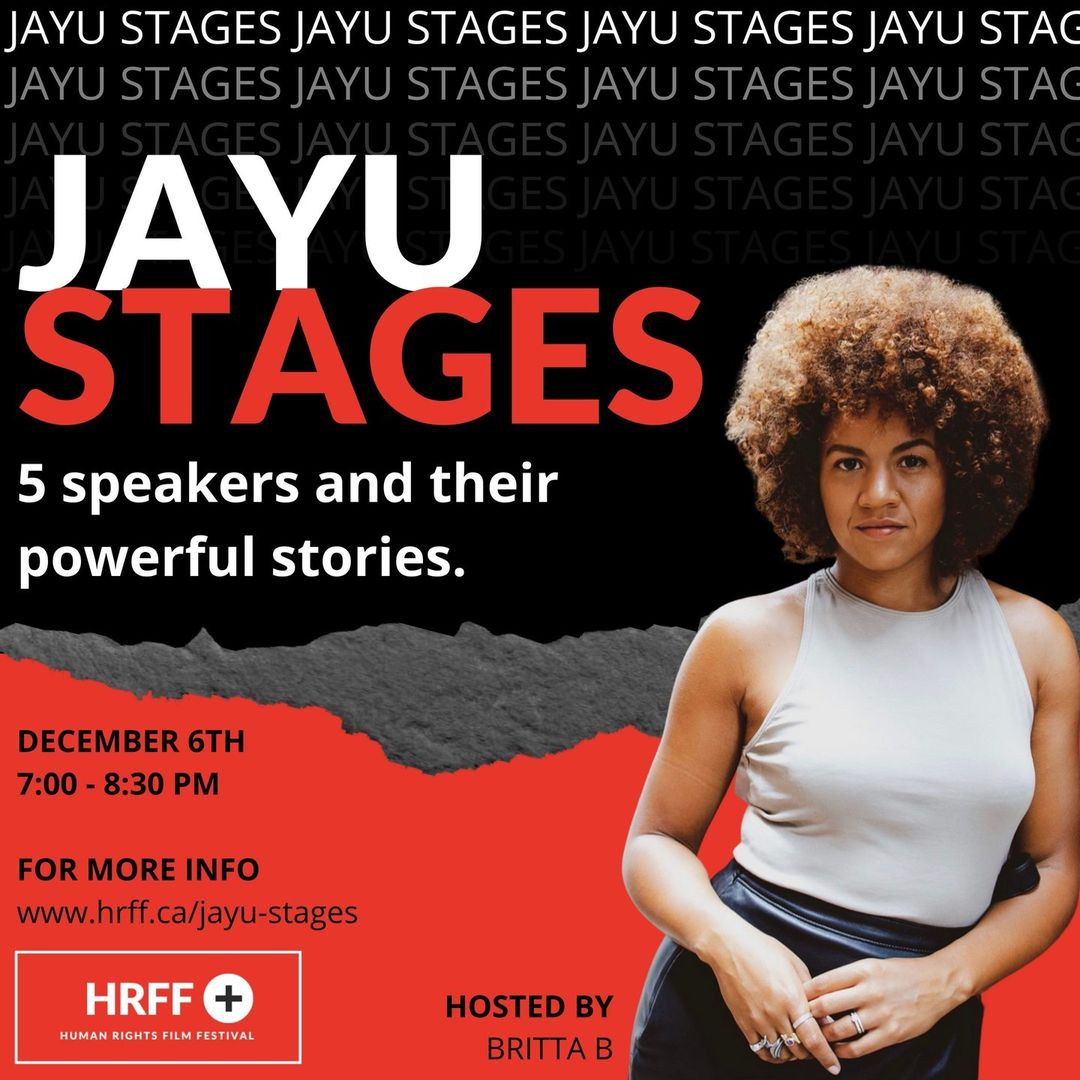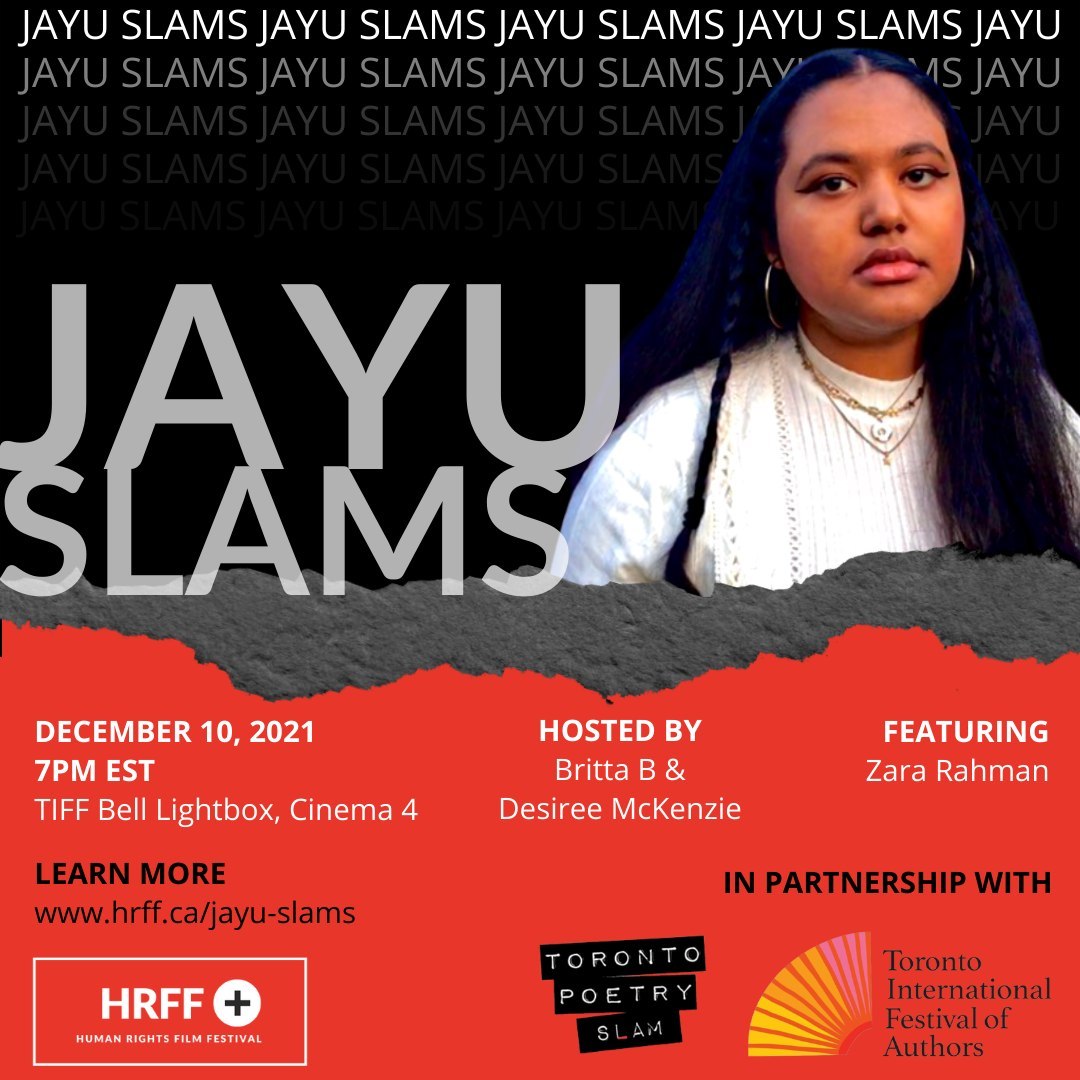Advocacy Spotlight: Human Rights with JAYU Toronto
JAYU is a Toronto based charity that's dedicated to accessibly sharing Human Rights stories through the arts. This week we will be highlighting our conversation with Desiree Mckenzie, the iAM Program Coordinator.
Desiree Mckenzie (she / her) is an award-winning poet, arts educator, national poetry slam champion, and iAM Program Coordinator at JAYU. Her poetry has been featured in CBC’s Poetic License series, VIBE Arts NExT Exhibit, When Sisters Speak, and Clearco Financial’s International Women’s Day Campaign. In 2020, she was awarded the JAYU iAM Arts for Human Rights Award recognizing creatives doing exceptional work where the arts and human rights intersect. As a facilitator, she works with organizations like Unity Charity, JAYU, Poetry In Voice, and VIBE Arts, bringing poetry into classrooms and community spaces across the country. In March 2021, she released her EP, Wet Hair, now available on streaming platforms.
→ Website | Instagram | Facebook | Twitter
Interview Transcript
 Rashmeet: What's the name of your organization that you're representing today? Who are you? What's your role within this organization? And if you're comfortable, could you share your pronouns as well.
Rashmeet: What's the name of your organization that you're representing today? Who are you? What's your role within this organization? And if you're comfortable, could you share your pronouns as well.
Desiree: Yeah, so my name is Desiree. My pronouns are she/her. I am the IAM Program Coordinator at JAYU, a Toronto based charity that's dedicated to sharing human rights stories through the arts.
Rashmeet: Wonderful, so what exactly does JAYU do? I know you said they're based in Toronto and they're doing some charity work related to the arts, but what else are they involved in?
Desiree: Yeah, so definitely JAYU does wear a bunch of different hats, but we're an arts organization. Like I said we focus on sharing human rights stories through the arts, so we have a number of things that we do that sort of revolve around that. At its core, we firstly have the IAM program which delivers arts, mentorship, programming, and paid opportunities to equity-deserving youth in poetry photography, collaging, filmmaking, and we even started jewelry making this year. This is what I work on directly year-round and it basically helps these youth develop different methods, ways, and techniques to explore art as an outlet for them to tell their Human Rights stories and to speak on the issues they want to speak on.
We also have the Hum Podcast which is hosted by our founder, Gilad Cohen, where he speaks with different people who work in Human Rights spaces or who have suffered from Human Rights abuses.
And then finally most importantly right now is the Human Rights Film Festival coming up. It's our annual Film Festival where we showcase films from across the globe that cover different Human Rights stories. It's actually our 10th year this year and it's called the HRFF+ now because we've introduced a poetry slam, a comedy night, workshops, programming panels, and different things like that to really make it appealing to any artists from any art form.
Hum Podcast - Episode 20: We Think Of Our Racism As Out Of The Ordinary
Rashmeet: Yeah, that’s so cool! When is the Human Rights Film Festival happening this year?
Desiree: Yeah, so it's between December 1st to 10th. And it'll be in a range of both, either in-person, virtual, or hybrid events that people can attend. Everything is 100% free.
Rashmeet: Great, that's some exciting news and work! I think that all these events and programs sort of speak to this already, but what are some of the values that JAYU is grounded in?
Desiree: Obviously like I said, using the arts as a tool to tell different Human Rights stories. That's a huge, huge part of it. Whether that's poetry, whether that's good filmmaking. We always have that at the forefront of everything that we do. Another really, really big thing is accessibility. As a Human Rights organization, that's key. Ensuring that everyone, no matter what, can attend our events, can come to our workshops. And we do that by making all of our programming, everything from the IAM programs to our film screenings, 100% free so no one is turned away for lack of funds. We also have ASL interpreters at all of our events for the deaf or hard of hearing community. We also have an active listener at our events.
So, for example, since we speak on, cover, and shed light on a lot of issues that may be heavy or activating for people, we think that it's important to give people resources to help them be able to decompress, be able to process, and be able to leave our events not feeling triggered or activated. The active listeners are there to help as a resource and help ground people needing support. So those are the two really big things that that we’re rooted in: accessibility and using the arts as a way to share human rights stories.
Rashmeet: Yeah, for sure! I definitely agree that having those extra supports is necessary and helpful, but unfortunately often overlooked. So, I definitely appreciate that the active listeners are a resource that you provide, in addition to all the other wonderful things that you're doing. Also, I know you mentioned that a lot of the IAM programs, which I have been fortunate to be a part of, are meant to give access to equity-deserving youth. Can you speak a little more about what that means to you? What that means to JAYU?
JAYU - iAM Program Video
Desiree: Yeah, so absolutely equity-deserving is anyone who identifies as Black, Indigenous, racialized, anyone within the LGBTQ2S+ community. So, these programs are a huge way for them to gain access to resources and opportunities that they may not have had. These programs are free, which that's a huge part of it as well. And we also want this to be something they come, they do, they build community, they learn about an art form that maybe they haven't before from industry professionals and other people who have taken the program.
But also, a huge part of why we do this is to expose them to how you can turn the arts into a career. You can turn it into something you make money from. These programs also give them paid opportunities like coming back to be a junior mentor, which is someone who has taken our program and then comes back and helps mentor the class with the lead mentor. As well, we have a lot of partners in different things and other arts organizations that are always looking for artists. So, for example we'll get reached out to saying oh, do you have a photographer to do this? And we will always send out one of our youth. We will always connect them with that organization. Otherwise, they may not have had that that access or the resources or even know how to do an invoice. So, I think that that's a huge part of it as well.
Rashmeet: Yeah definitely, and for me, as a past participant, it's also been special to create and involve myself in that community. I feel like I wouldn’t have access to that regularly. So that's been definitely life changing and something I've appreciated as a youth coming to these programs.
Desiree: Yeah, it's really cool because everyone has their own style and their own way of doing things, and I think that this is what's so great! You meet so many people who come from these programs and everyone is kind of doing their thing in a different way. Everyone, might end up doing different styles of poetry or might do different types of photography and have a different aesthetic. Whatever their thing is, you meet people and that's all part of networking. But it's especially cool in an environment where you're all learning together.
Rashmeet: Yeah, definitely. And I think that plays into the next question, what are some of the goals that JAYU is working towards? These can be long-term or short-term.
 Desiree: I think definitely continuing with the IAM programming, having the program go on and become even bigger, and have even more youth involved from all across Ontario. And even expanding what some of the topics we cover in the program are beyond just poetry or filmmaking or collaging. I'd love for there to be an IAM dance program one day. I'd love there for there to be IAM textiles one day. Everything like that because there are so many different ways of telling stories. So, I hope to definitely see that happen more.
Desiree: I think definitely continuing with the IAM programming, having the program go on and become even bigger, and have even more youth involved from all across Ontario. And even expanding what some of the topics we cover in the program are beyond just poetry or filmmaking or collaging. I'd love for there to be an IAM dance program one day. I'd love there for there to be IAM textiles one day. Everything like that because there are so many different ways of telling stories. So, I hope to definitely see that happen more.
And I hope for example, for things like our festival coming up that it just grows and grows and grows. We can have even more events and even more speakers and even more artists from different backgrounds and with different knowledge and expertise. I think that's what's really exciting, so that's what I'm hoping for.
Rashmeet: Yeah, I think storytelling has definitely been an emphasis of all the IAM programs that I've been a part of. I’ve really enjoyed learning how to situate my story telling skills with a social justice lens. IAM has changed my perspective on how I experience things and how I choose to share them with others.
Desiree: Yeah, absolutely! I hear that. That's awesome!
Rashmeet: Okay, so I know you said you're the IAM Program Coordinator, but what does a day in your role look like at JAYU?
Desiree: Yeah, that's a good question. It really varies. It could be every and anything from mailing out program packages before the program starts. For our programs we send out journals and some snacks, different things like that, because when we were doing in-person programming, one thing we would do was provide lunch, journals, writing utensils, and more. I also, plan with the IAM Program Manager, Celeste Cole, who's the brains of the program. I can be involved with admin stuff, like making sure all of the mentors are prepped and they have all of the documents they need. But yeah, it really depends on where we are in the year and what's going on. I know Celeste is in charge of planning the workshops, but that kind of goes hand in hand with IAM programs and also trying to find ways to create IAM youth employment opportunities through the different elements of the festival. There's always something to do, always something happening. But that's what makes it exciting.
Rashmeet: Cool, yeah and how long have you been in this position for?
Desiree: Yeah, technically I started with JAYU last year in October as a Festival Coordinator. So, I was just assisting with the Human Rights Film Festival last year. But this year I became the IAM Program Coordinator.
Rashmeet: Alright and can you tell me why you’re passionate about the work that you do and this can be either like as the Festival Coordinator or as the IAM Program Coordinator?
Desiree: Yeah, I'd say it's sort of all encompassing. I think no matter what the position is, everything from working on the Film Festival to everyday sort of year-round IAM stuff. I'd say one thing for me that I I've always loved about sharing the arts with people and using that as a tool to connect with others is that you just you never know how something can impact someone. For example, everything from doing a workshop to someone watching one of the films we screen at our festival, or coming to the poetry slam at the festival, or whatever it is, we can all be gathered in a room and taking it all in.
But then when we leave, I don't know how that will impact people. I don't know if they'll ever think about it again. I don't know, but on the other hand, that's the beautiful thing about it. I don’t know about the impact and where and how that can inspire people, how that might help someone come up with an idea later or become educated on a certain topic that they weren't before and become very passionate about and wanting to be an advocate for that. It's just like planting a seed, and I think that's really beautiful. It's like planting a huge forest and then, just leaving it and then never checking it out again. Just kind of letting things run their course, but knowing it's going to grow and it's going to be huge eventually. So, I think that that's a really cool thing about it and it can apply to everything from our IAM programs to any of the events at our festival. That impact just grows and grows and grows.
Rashmeet: Yeah, that’s beautiful! And honestly, the work that you folks do is so empowering and before participating in some of these programs, I was like ‘Oh no, I'm not a poet,’ but now I'm like actually, you know what, I am.
Desiree: Yeah, the programs redefine that. Like what does being a poet really mean? What is that like? And that’s the beautiful thing about it. So JAYU definitely tries to do that through everything they do.
Rashmeet: Alright, so have there been any challenges during your time at JAYU and how have you overcome these?
Desiree: Last year working on the Film Festival, having everything be online was a challenge. It was my first ever festival that I've worked on, so I know for anyone who had been at JAYU longer than I was, they would feel the stark difference. But planning things for online is so different and it just it can be challenging in its own way to coordinate everything. But on the other hand, that challenge is actually something that made us realize how inaccessible just having in-person programming is and how you can reach so many more people by doing things virtually. So, I think that our challenge kind of actually turned into a realization.
Human Rights Film Festival Trailer
Rashmeet: Yeah, moving services online shook everyone a little bit. Also, I’m curious, that as someone who’s very embedded in Human Rights work at JAYU, can you offer some advice or resources to folks that are looking to get involved either with JAYU or just in general with advocacy work?
 Desiree: I'd say one thing for sure is check out some of the events that are coming up for the Human Rights Film Festival from December 1st to 10th. You can check out hrff.ca for more information. You’ll get to hear about more about the work we do and how it ties into different Human Rights stories, but one thing that's really cool is with each of our events we have community partners.
Desiree: I'd say one thing for sure is check out some of the events that are coming up for the Human Rights Film Festival from December 1st to 10th. You can check out hrff.ca for more information. You’ll get to hear about more about the work we do and how it ties into different Human Rights stories, but one thing that's really cool is with each of our events we have community partners.
For example, one of our events is called JAYU Stages. It's on the National Day of Remembrance and Action on Violence against Women on December 6th, and we're an arts organization so we may not have all the resources for someone who may be affected or suffering from intimate partner violence. So, what we always have at all of our events, are our community partners or co-presenters who are organizations who are actually doing work in those specific spaces. So, for example, with JAYU stages we've partnered with Interval House, which is Canada's first shelter for women who are trying to leave abusive, intimate partner violence relationships, and Elizabeth Fry Toronto for women who have had issues with the law.
So, I highly recommend checking out our website to learn how to get involved with both us and them. But, also one last thing you can do if volunteering isn't what you would like to do or you'd like to support in some other way, a huge part of what we do at JAYU is all of our programming is free and we want to keep it that way and we wouldn't be able to do that without the generous support of donors and people who believe in what we're doing and support us. So, if you are able to, you can donate and get a tax receipt.
Rashmeet: Wow, thank you! I just want to end this interview off by asking you what your most favourite memory or accomplishment is at JAYU?
 Desiree: The poetry slam at the Human Rights Film Festival is really exciting! Last year I got to plan and host a poetry slam with Britta B. I started with JAYU by being a participant in the poetry program and Britta B was the mentor of that in 2019. That was an amazing, amazing experience and I always say it really changed my life. So, I'd say last year I got to help plan the poetry slam and then this year it's happening again and it's really exciting because we're giving away $1000 and all and all the other poets in the competition will receive $100 just for participating, which is really cool and one of a kind for slams. It’s really exciting and it's at the TIFF Bell Lightbox, so it's in-person again. It's just going to be such a great atmosphere and a lot of fun, so I'm really excited for that.
Desiree: The poetry slam at the Human Rights Film Festival is really exciting! Last year I got to plan and host a poetry slam with Britta B. I started with JAYU by being a participant in the poetry program and Britta B was the mentor of that in 2019. That was an amazing, amazing experience and I always say it really changed my life. So, I'd say last year I got to help plan the poetry slam and then this year it's happening again and it's really exciting because we're giving away $1000 and all and all the other poets in the competition will receive $100 just for participating, which is really cool and one of a kind for slams. It’s really exciting and it's at the TIFF Bell Lightbox, so it's in-person again. It's just going to be such a great atmosphere and a lot of fun, so I'm really excited for that.
Rashmeet: That sounds like such a good time! Is the slam the event that you're most looking forward to for the Film Festival, or do you have any others?
Desiree: Yeah, I'd say there's two. It's kind of the book ends of the event, one of them being the slam on December 10th, and then on December 1st we're doing the Toronto premiere of the documentary BEING BEBE, which is all about Bebe, the winner of the first ever season of RuPaul's Drag Race. So, it's a screening of that of that film and we also have a Q&A directly after the film with the film’s director and Bebe herself. And that's going to be at the Hot Docs Ted Rogers Cinema in Toronto and people will also be able tune in virtually. A big thing with all of our film screenings is that the films will be sent as link with 24-hour access.
Being Bebe Trailer
Rashmeet: Yeah, that's lovely because that also plays into accessibility as well! Well, thank you so much for taking the time to speak with me today, Desiree!
Desiree: My pleasure!
